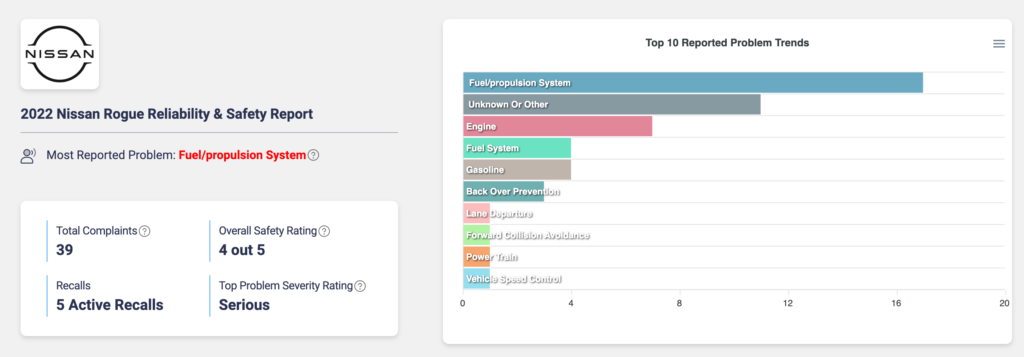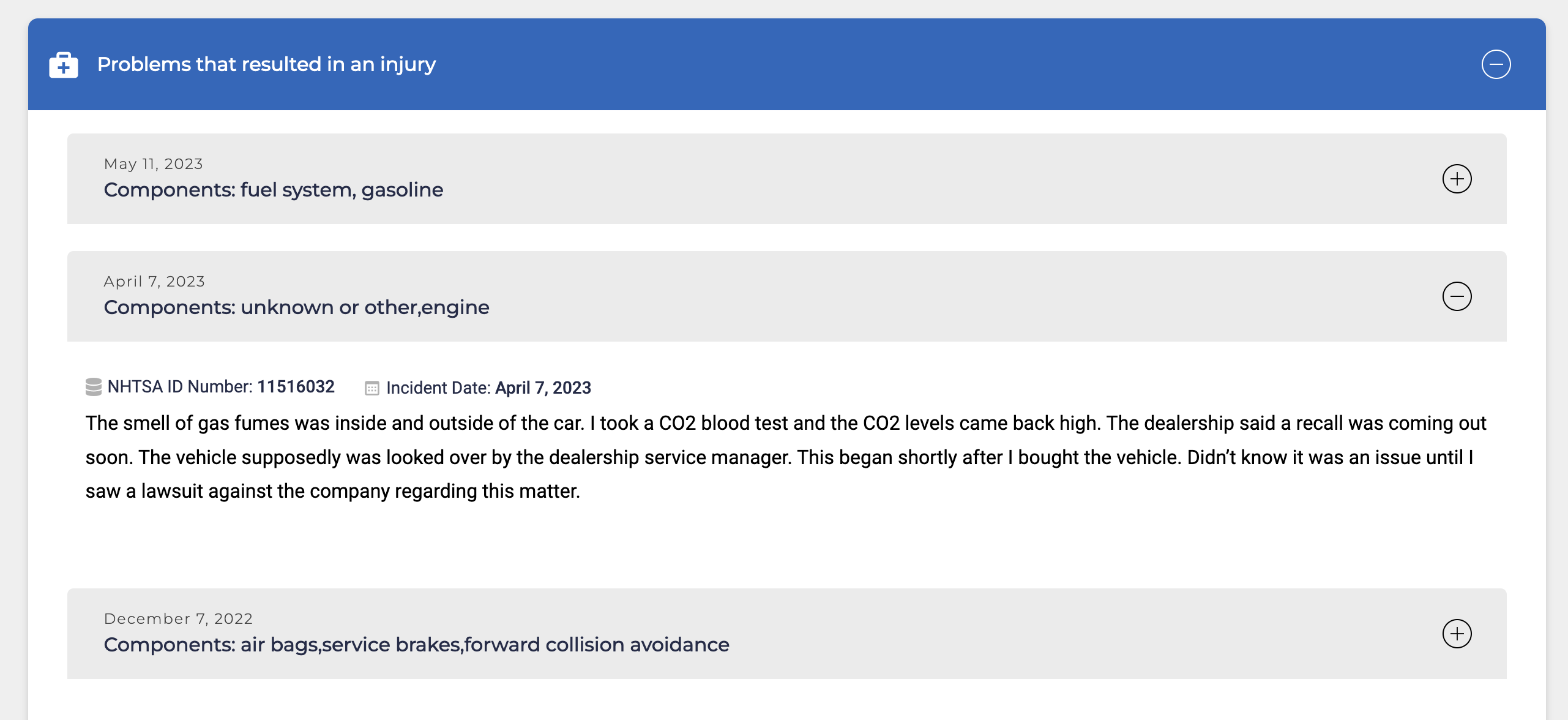If you own a 2021-2023 Nissan Rogue, you may have noticed an unusual gasoline smell inside your vehicle. If so, you’re not alone. In fact, many Rogue owners of the same model year report that they are experiencing these symptoms, and a class action lawsuit has been filed against Nissan on behalf of affected owners.
The lawsuit, Young v. Nissan North America Inc claims that the 2021-2023 Rogue models have been sold with an engine defect that causes fuel contamination of the engine oil. The alleged defect causes a strong odor of fuel inside the cabin of the vehicle, and oil dilution.
As a result, the defect has caused numerous complaints from owners about gasoline smells.
Despite Nissan Rogue owner complaints of the cabin smelling like gasoline, there is a potentially more serious problem lurking beneath the surface. It appears these drivers are facing engine issues which causes oil dilution problems.
Simply put, oil dilution results in decreased oil viscosity causing premature wear of the engine’s internal parts. Ultimately, resulting in engine failure.
Let’s take a closer look into the 2021-2023 Nissan Rogue gas smell and oil dilution problem, and what it means for customers long-term.
Owners Allege Nissan Rogue Gas Smell Consumes Cabin of Vehicle
Scott Young, the Nissan Rogue owner leading the lawsuit against Nissan North America Inc., claims one of the tell-tale signs of the oil dilution problem is an “overbearing gasoline smell” in the cabin of the vehicle.
However according to the complaint, Nissan tells owners 2021-2023 Rogues to continue to drive despite the smell of gas. They suggest rolling down the windows and adjusting the air conditioning to try to make the smell go away.
The lawsuit cited a number of complaints filed with the NHTSA, some of which alleged that the odor emanating from the vehicle began after driving a few thousand miles.
In fact, our own vehicle reliability report tool has also identified the defect as a widespread problem as for 2021-2023 Rogue owners.

Owners also report of the gas odors permeating the entire garage after parking the car, with one driver claiming that their children were experiencing sickness as a result.
Truth be told, inhaling even minor quantities of gasoline fumes may cause irritation in the nose and throat, as well as headaches, dizziness, nausea, vomiting, confusion, and respiratory problems.
Additionally, a few complaints indicated that the gas smell was so overpowering that some drivers feared the car could catch fire from the fumes.
Understanding the Significance of The Nissan Rogue Gas Smell
Despite the inconvenience of the fuel odor inside the cabin of the vehicle, there is a more costly defect hidden behind that smell.
That is, of course, when the car’s oil gets mixed with the gas. This issue will cause problems such as fouled spark plugs, damaged engine, and other issues. This is commonly referred to as, oil dilution.
In fact, oil dilution reduces the lubricating properties of the engine oil. On average, the percentage of viscosity reduction due to oil dilution can range from 5% to 20%.
However, the actual percentage can vary widely depending on the specific circumstances, such as the type and amount of diluent, the base oil used, and the operating conditions of the engine.
Simply put, the oil becomes less capable of withstanding the higher loads of an internal combustion engine.
As a result, contact between metal surfaces within the engine begin to lead to rapid wear of internal bearings, the rotating assembly and other internal parts.
This means that 2021-2023 Nissan Rogue owners will need to spend more money on maintenance because of this problem. Or worst, suffer engine failure.
It also means that there will be more contaminated oil that needs to be disposed of, which is bad for the environment.
As such, 2021-2023 Nissan Rogue owners who begin to notice a strong odor of fuel inside the cabin of their vehicles will almost certainly have oil dilution issues.
Owner Alleges Engine’s Variable Compression System to Blame
According to Young, a flaw in the engine’s variable compression system leads to the seepage of gas into unintended areas. This results in a series of enduring complications and accelerated degradation of engine components if left unaddressed.
Nissan’s Variable Compression Engine (VCE) is unique, in that allows the engines to alter the compression ration from 8:1 (providing more vehicle power and less fuel efficiency) to 14:1 (providing less power and more fuel efficiency).
In fact, the VCE engines contain a unique linkage in the crankcase that adjusts the piston stroke by just a few millimeters, which alters the compression ratio.
By changing the position of the crankcase linkage, Nissan’s VCE engines can increase fuel economy by altering the compression ratio.
Due to the unique engineering of the VCE engines, fuel injectors are mounted on the cylinder head, rather than on the intake manifold found in traditional engines.
Otherwise known as Direct Injection Gasoline (DIG), fuel is injected at a very high pressure directly into the combustion chamber rather than through the intake manifold.
Because of the high fuel pressures required for the DIG system in the Class Vehicles, some of the fuel injected into the combustion chamber remains unburned.
The unburned mixture of air and gasoline is then pulled down by the piston, slipping by the piston and oil control rings, and goes directly into the crankcase, which is the protective cover that insulates the crankshaft.
This is commonly referred to as “blow-by” and is a common term used to describe the unwanted occurrence of unburned gasoline entering the engine’s crankcase.
This occurrence, known as oil dilution, leads to a significant contamination of the engine oil stored in the oil pan. When this happens, it can negatively impact the lubricity and viscosity of the engine oil.
This isn’t good for Rogue owners, as it may cause damage to engine bearings, the valve train, fuel injectors, and even the cylinder walls.
However, the most noticeable side effect of this problem, is of course the gas smell inside the cabin of the vehicle.
How Do I know my Nissan Rogue Suffers From Alleged Defect?
One tell-tale sign of the previous mentioned “blow-by” occurrence is the smell of unburned, raw gasoline in the vehicle cabin and within the vicinity of the exterior of the vehicle, as alleged by the Plaintiff.
Additionally, the oil dilution will cause the oil level in the crankcase to increase. Periodically checking your oil levels will begin to show clues of alleged defect.
Another way to tell if your Rogue suffers from this defect is to check the oil dipstick for a strong fuel smell.
Despite Widespread Consumer Complaints, Nissan Continued to Advertise Rogues as Reliable, Safe, and Top Quality
Nissan has not recognized the Engine Defect in Class Vehicles to Class Members, despite widespread consumer complaints of a strong fuel smell and other associated issues.
Additionally, Nissan’s failure to inform the general public, owners or lessees of the Class Vehicles regarding the Engine Defect is especially alarming.
This is due to the fact that the Class Vehicles, after experiencing the Engine Defect, not only experience a strong fuel smell while being used but also run the risk of catastrophic engine failure while in use.
As one can imagine, this can result in the driver and passengers being left stranded, putting them at a greater risk of harm.
However, Nissan provided a specific warranty for the Class Vehicles, guaranteeing to be free from defects for either 36,000 miles or three years with the Limited Warranty, or 60,000 miles or five years with the Powertrain Limited Warranty.
These warranties cover the Engine Defect, but Nissan has not successfully addressed the problem.
According to the complaint, Nissan’s system is “simply inadequate to prevent and address fuel contamination of the crankcase,” resulting in the Nissan Rogue gas smell.
2021 to 2023 Nissan Rogue Owner Voices
The contact owns a 2021 Nissan Rogue. The contact stated that the fueling system was leaking. There was an abnormal odor of fuel detected. While driving at an undisclosed speed, the vehicle lunged forward and stalled but restarted. The alternator warning light was illuminated. The vehicle was taken to the local dealer but the vehicle was not diagnosed or repaired. The manufacturer was not contacted. The failure mileage was approximately 5,500.
Complaint Number: 11488158
The contact owns a 2023 Nissan Rogue. The contact stated there was an abnormal fuel odor inside and outside the vehicle. Upon inspecting the vehicle, the contact found no visible leaks coming from the vehicle. The vehicle was then taken to the dealer where the mechanic also could not detect any leaks coming from the vehicle. The manufacturer had been notified of the failure and provided a case number. The vehicle was not repaired. The failure mileage was approximately 2,000.
Complaint Number: 11500268
For several weeks I have noticed strong smell of gasoline when my car is parked in my garage. Today, I called my Nissan dealer because I am very concerned. The service advisor informed me that they have received many similar complaints and Nissan is supposedly trying to identify and remedy the problem. He said my car is safe, but I am terribly concerned.
Complaint Number: 11499442
Nissan Rogue Models Affected
The following Nissan Rogue models are affected by this alleged defect:
Status of the Nissan Rogue Class Action Litigation
This is an active class action lawsuit. Young v. Nissan North America Inc, case number 3:23-cv-00394, in U.S. District Court for the Middle District of Tennessee.
Questions About This Lawsuit?
MyCarVoice.com is not counsel or the settlement administrator in this class action lawsuit. Our goal is to inform owners of these vehicles of the recent lawsuit. This post will be updated when/if new suit information is released.
Please considering subscribing to this post for critical updates.
Are you driving a Nissan Rogue made between 2021 and 2023 and having issues with a strong gasoline smell in your car? If so, add your voice to this post in the comments below.
Add your car complaint for review

Managing Editor
Christopher is an automotive technical writer. When he’s not at the local autocross event, he can often be found working on one of his cars. Specializes in automotive class action law, industry trends, and automotive maintenance. Email me direct, or learn more about us


Joe
April 4, 2024 at 10:49 pmI bought a 2023 Rogue SV 8/23. I noticed gas smells in my garage and inside the vehicle when parked for short periods of time. Just went in for oil change today (4/4/24) and they also replaced the pcv hose per the service bulletin. We will see if this does anything with the smell.
Elizabeth Prince
December 29, 2023 at 7:30 amI bought a 2023 Nissan Rogue in September of 2023. At 4,000 miles I am now experiencing the smell of gas in the cabin. I have not yet taken the Rogue to the dealership but I plan to so that the issue is documented.
Christopher Rossen
January 2, 2024 at 9:29 amKeep us posted on this Elizabeth.
Pam
February 8, 2024 at 11:04 amI contacted my dealership last year about the smell of gas inside my car and outside. I was told that engineers came here to look at my vehicle. A pre-production part was put on my vehicle to fix the problem. Less than a year later, my car smells again. I again contacted the dealership. They recognized that I was the one the engineers flew here for to check my vehicle. I was advised I can order the post production part that is part of a bulletin Nissan put out about this issue.
Christopher Rossen
February 9, 2024 at 10:08 amKeep us posted if this part resolves the gas smell.
Janet Harris
March 29, 2024 at 12:02 pmPurchased our Rogue Dec 2022. Gas smell started about 3000km. Took several months, but they replaced part Spring 2023. Gas smell went away, but came back near end of 2023 (~6000km later). I believe it might be triggered by winter weather. We will be having part replaced again. Super annoying. The smell is definitely headache inducing! We essentially had to stalk Nissan to get the initial fix, but now I am worried we have an irreparable lemon thar will need new parts every year!
Nathan
November 30, 2023 at 11:16 amI am pretty sure I have suffered from this and now am $7000 in the hole because of it. Please let me know if I can help or if they would like to hear my story it’s a good one.
Lance Lind
November 19, 2023 at 8:26 pmBought our 2023 sv in june, as temps are dropping in northern minnesota, just started to notice this issue this week, with 8000 miles, checked oil an level has raisen, an garage stinks as does this whole issue!
Bob
August 23, 2023 at 7:17 pmMy sister is having her 2023 Nissan Rogue’s engine replaced after just 5K miles of ownership. It died at an intersection, and the dealership found that the oil was already black. She takes meticulous care of her cars.
Kevin
November 16, 2023 at 1:58 pmI too am having this issue. I noticed it five days ago in my garage and started smelling it inside my Rogue. 2023 Platinum with under 1600km. I opened the oil cap yesterday and it smells only of gas, not oil. Not pleased about this…
Matt
August 21, 2023 at 10:46 pmHello Chris. Our 2021 Rogue is having this issue. We noticed it recently and are getting headaches inside our car. We’ve contacted Nissan and they seem to not know anything about this issue. We googled it to see if others were having problems and came across your article. What do we do from here?
Christopher Rossen
August 22, 2023 at 8:50 amMatt, most dealerships will not be aware of this issue just yet. Unfortunately you will need to deal with this until this case comes to a resolution. And this problem is becoming more wide spread in fact, as I see reports of fuel smell in MY2022 and MY2023 Rogues: https://app.mycarvoice.com/trends/NISSAN/ROGUE/2023/
I discussed this with our partner attorney and he suggests getting the vehicle looked at by Nissan, and have them document the problem. Of course they won’t have a fix, but gettin this issue on record early helps. Additionally, you should file a complaint with the NHTSA. If enough owners file complaints, they may force Nissan to fix the issue. Of course, subscribe to this page to keep updated on any news pertaining to this case. Hope this helps.
Diane Dillane
November 2, 2023 at 4:53 pmI just bought a 2023 Nissan rogue and am experiencing gas problems smells inside the car
Christopher Rossen
November 2, 2023 at 4:58 pmThanks for the message Diane. Have you taken it to the dealership for inspection? If not, it would be a good idea to begin documenting this issue.
Don Griffin
July 21, 2023 at 6:25 pmWe purchased our Rogue used from Carmax with 7,700 miles. We noticed a smell but didn’t know what it was. After reading this article I checked my oil level and it’s above the full mark. It smells like my outboard boat motor gas. It is a mixture of oil and gas. We will be taking our vehicle to the nearest Nissan dealer Monday morning. How can I join this suit?
Trish
June 9, 2023 at 10:32 pmI have a 2023 Rogue Platinum. First notice the gas smell only occasionally at about 2000 miles. Now I am at almost 3000 miles and the gas smell is stronger and more frequent. I have always gotten instant headaches when smelling gas so now I get to drive with a busting headache daily. I cannot trade it because I have no equity. My down payment was the payoff for my car that was totaled in a crash. How can we know if they are “really” working on a fix or if that is just a line to put us off?
Christopher Rossen
June 10, 2023 at 4:09 pmTrish, we are unaware of any fix from Nissan. My recommendation is, get the vehicle to the dealership you purchased it from. Have them document the problem. If/when the gas smell gets worst, take it back and have them document the problem again. Checking our vehicle reliability reports, I am seeing the fuel problem trending for this vehicle, so you are not alone with this issue. Sample report can be seen here: https://app.mycarvoice.com/trends/NISSAN/ROGUE/2023/
David
May 28, 2023 at 5:36 pmHello Christopher, I thank you for this very complete and useful article that you have shared with us! I own a 2023 Platinum Nissan Rogue. It only has 300 miles, I just bought it, so far it hasn’t had any fuel smell problems, but I’m extremely concerned from what I’ve read! The graph of the top 10 customer complaints about this model of car caught my attention and I see that they are relatively few with respect to the universe of cars sold of this model, so I ask you: do you think that this fault affects or will affect the 100% of the cars purchased or are they individual or circumstantial cases? Thank you very much in advance for your answer!
Christopher Rossen
May 30, 2023 at 7:26 amHi David, thanks for the kind words regarding this article. So, will this issue affect 100% of these cars, is really hard to say at the moment…and info is still being obtained regarding the impacted population. However, what we are seeing via the reliability report is that complaints for this model year is already trending higher than the previous model year. Additionally, some complaints filed with the NHTSA(source of data) report of injury due to this issue.
My advice, enjoy the vehicle but should you begin to smell fuel, please contact your Nissan dealer and also let NHTSA and MCV know of the same so we can keep track of impacted vehicles.
Full reliability report found here: https://app.mycarvoice.com/trends/NISSAN/ROGUE/2023/
Cost $2.99 to unlock full report, but well worth it for those looking to purchase new or used vehicle.
Bob True
May 12, 2023 at 4:58 pmHonda had and probably has the same issue with their 1.5 Turbo Earth Dreams Engines, first they said it was only in cold climates, wrong, then it was because of short trips, then they did some software upgrades that was suppose to help the engine build temperature quicker, I’m not sure of the success or failure of that. This may be an issue the DGI engines, but I haven’t seen anything about others, Toyota seems to have a better plan for fuel injection in small turbo charged engines.
Being an old school guy, why not reduce the pressure on the injectors, if I understand this correctly, the injectors are already at each cylinder so it should not take much fuel pressure to travel a short distance and ignite or how about hotter spark & timing? Just thoughts.